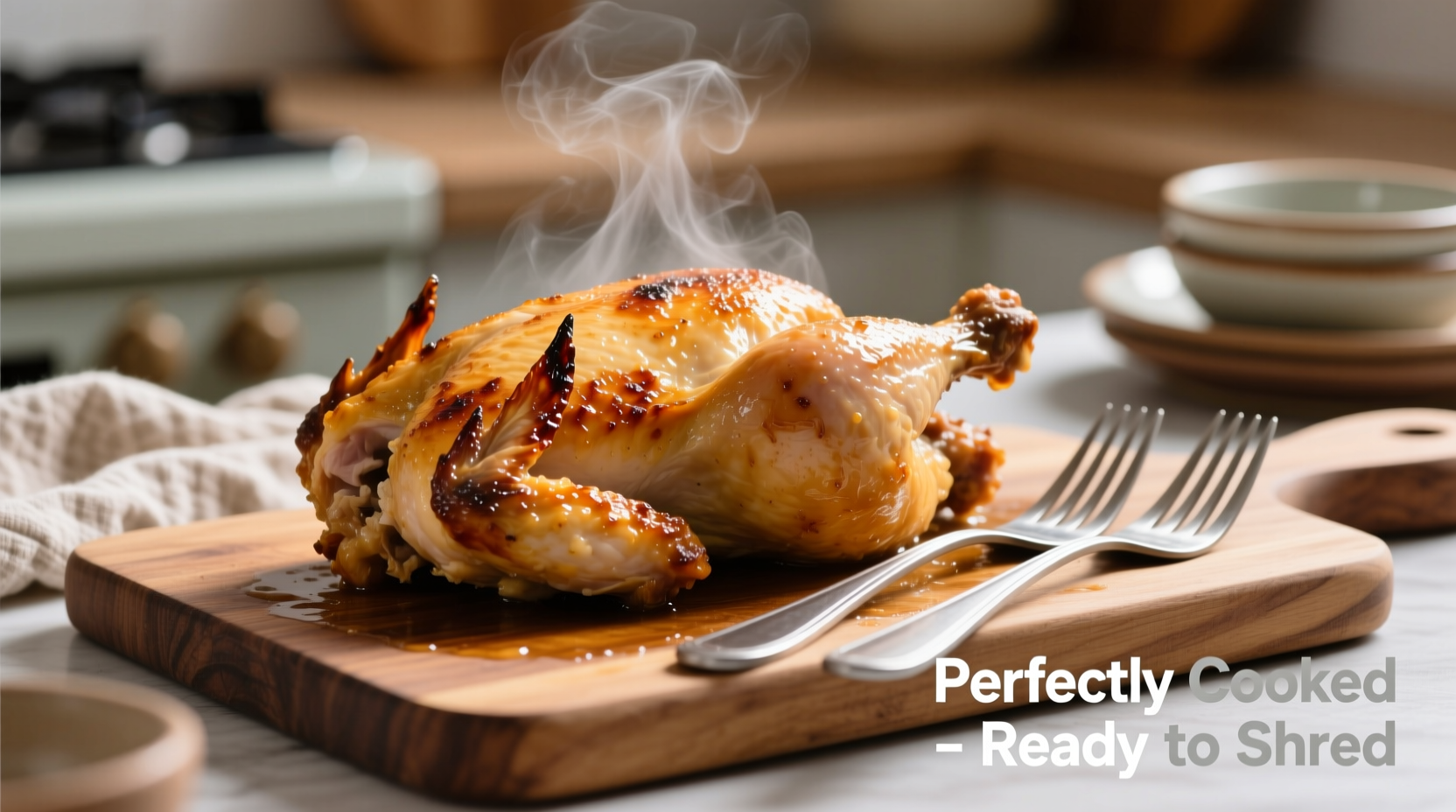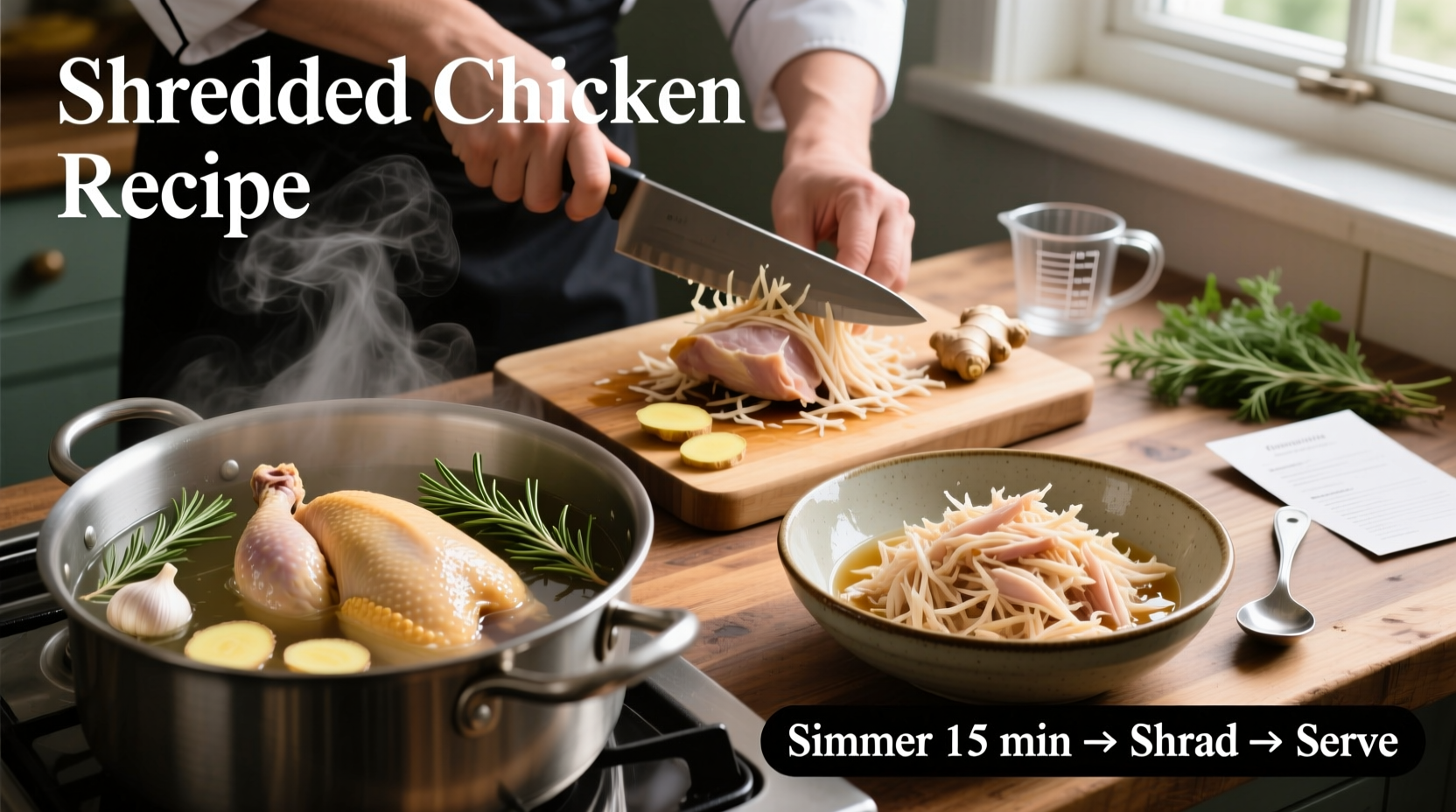Planning Your Shredded Chicken Project
Before you start cooking, proper planning ensures your shredded chicken turns out perfectly tender and flavorful. The key is selecting the right cut of chicken and understanding how different cooking methods affect texture.
For shredded chicken applications, boneless, skinless chicken breasts or thighs work best. Breasts provide leaner meat ideal for salads, while thighs offer richer flavor and stay moister during cooking—perfect for tacos and sandwiches. Aim for 1.5 to 2 pounds of raw chicken to yield approximately 4 cups of shredded meat.
Regardless of your chosen method, always start with properly thawed chicken. The USDA Food Safety and Inspection Service recommends never cooking frozen chicken directly for shredding applications, as uneven cooking leads to dry, stringy results in some areas while other parts remain undercooked (USDA Poultry Guidelines).
Three Foolproof Cooking Methods Compared
| Cooking Method | Time Required | Effort Level | Texture Result | Best For |
|---|---|---|---|---|
| Boiling/Poaching | 12-15 minutes | Low | Tender, uniform texture | Quick meals, soups |
| Slow Cooker | 3-4 hours | Very Low | Extremely tender, moist | Meal prep, busy days |
| Baking | 20-25 minutes | Moderate | Rich flavor, slightly firmer | Tacos, sandwiches |
Mastering the Boiling/Poaching Method
Boiling or poaching delivers the fastest route to perfectly shredded chicken. Fill a large pot with enough water or broth to completely cover the chicken (about 4 cups liquid per pound of chicken). Add aromatics like onion halves, garlic cloves, and bay leaves for enhanced flavor.
Bring the liquid to a gentle simmer—not a rolling boil—then add your chicken. Maintain a temperature between 160-180°F (71-82°C) for optimal results. Cooking chicken at too high a temperature causes proteins to tighten excessively, resulting in dry, tough meat that resists shredding.
Cook boneless, skinless chicken breasts for 12-15 minutes or until they reach 165°F internally. Thighs may require 15-18 minutes. Remove chicken immediately when done and let it rest in the warm liquid for 5 minutes before shredding. This resting period allows residual heat to finish cooking while keeping the meat moist.

Slow Cooker Technique for Hands-Off Perfection
The slow cooker method produces incredibly tender chicken with minimal effort. Place 1.5-2 pounds of chicken in your slow cooker and add just enough liquid to cover the bottom (about 1 cup of broth or water). Avoid submerging the chicken completely, as this can dilute flavor.
Cook on low for 3-4 hours or high for 2-2.5 hours. The low, slow heat gently breaks down connective tissues without overcooking the protein fibers. This method consistently yields the most tender shredded chicken, ideal for meal prep. Remove the chicken when it reaches 165°F internally and shreds easily with minimal pressure.
Professional chefs like those at the Culinary Institute of America emphasize that slow cooking allows collagen to convert to gelatin gradually, creating that signature melt-in-your-mouth texture perfect for shredding (CIA Culinary Resources).
Baking for Maximum Flavor Development
Baking produces shredded chicken with deeper flavor through the Maillard reaction. Preheat your oven to 375°F (190°C). Place chicken in a single layer in a baking dish and brush with olive oil. Season generously with salt, pepper, and your choice of herbs.
Cook for 20-25 minutes until the internal temperature reaches 165°F. For extra moisture, add 1/4 cup of broth to the bottom of the dish. The dry heat environment of the oven concentrates flavors while keeping the chicken sufficiently moist for shredding.
Food science research shows that baking at moderate temperatures prevents the rapid moisture loss that occurs at higher heats, preserving the juiciness essential for easy shredding (USDA National Agricultural Library).
Shredding Like a Professional
The key to perfect shredded chicken lies in proper cooling and technique. Let cooked chicken rest for 5-10 minutes until cool enough to handle but still warm. Shredding cold chicken requires more effort and can make the texture tougher.
Use two forks to pull the chicken apart, working with the grain of the meat. For larger batches, a stand mixer with the paddle attachment on low speed for 30-60 seconds creates perfectly shredded chicken in moments. Add a tablespoon of cooking liquid if the chicken seems dry.
For optimal texture in your final dish, reserve 1/4 cup of the cooking liquid to moisten the shredded chicken. This simple step prevents dryness in dishes like chicken salad or tacos.
Storage and Usage Tips
Store shredded chicken in an airtight container with some cooking liquid for up to 4 days in the refrigerator. For longer storage, freeze in portion-sized containers with cooking liquid for up to 3 months. Thaw frozen shredded chicken in the refrigerator overnight for best texture.
Transform your basic shredded chicken with flavor variations: toss with taco seasoning for Mexican dishes, mix with barbecue sauce for sandwiches, or combine with Greek yogurt and herbs for chicken salad. The versatility of perfectly cooked shredded chicken makes it an essential meal prep component.











 浙公网安备
33010002000092号
浙公网安备
33010002000092号 浙B2-20120091-4
浙B2-20120091-4